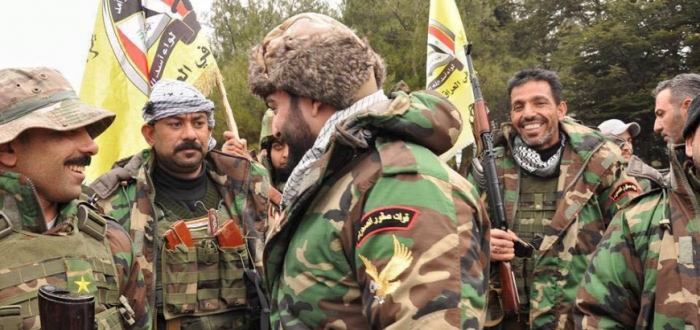Assad’s coastal stronghold of Lattakia, an area of strategic and symbolic importance for the regime, is home to countless loyalist militias which are said to be operating like a “state within a state” — largely independent and rarely held accountable to official state agencies.
The militias’ activities have increased substantially in Lattakia during the last two years, becoming the de facto administrators of the province. The Iranian intervention in Syria is one of the primary reasons for their increased prestige and influence within the province, often to the extent of placing them above the reach of the law, whether in carrying out abuses against civilians or engaging in illegitimate activities.
Local opposition rights activist Ali Khalil explained to al-Souria Net the Iranian role in the emergence of the militias and how Tehran exploited the internal divisions between members of the Alawite sect and played a role in strengthening one party over the other to achieve mutual interests.
Ali said that Iran took advantage of old divisions between the Haydireen and Kalaaziya clans of the Alawite sect. Tehran opted to support the Haydireen because it had been marginalized by the Kalaaziya (which the Assad family hails from), and because they knew this group represented the largest number of Alawites in the province. Ali said this interest led the Kalaaziya to feel they were falling behind, especially since they “felt disgruntled towards the regime, prompting some members to defect from the [Syrian] Republican Guard and affiliated brigades, like Brigades 105 and 106, to form local militias in the village of Qardaha instead.”
“Some security agencies called for members to be detained under the pretext of stopping the spread of corruption. This is what fueled the split between these militias and the Assad regime after its silence about them being targeted,” he added.
An example of the extent of these militias’ influence is that “the security agencies were able to arrest any member of the National Defense Forces (militia) and hold them to account until the issuance of decision by the national security office in Damascus in 2013, which prevented the detention of any National Defense member by security agencies, whatever the reason,” Ali said.
According to Ali, the Assad regime has no effective authority over these militias, since they do not respond to its orders and are armed by figures influenced by a strong relationship with Tehran. Their participation with regime forces in battles results from their own independent decisions. Ali explained these militias were regularly beyond the regime’s control, carrying out killings and abductions in cooperation with security agencies in Lattakia on an individual basis, which is what gives them immunity among security institutions.
Tehran, which looks to these militias as its arm in Syria, has played a key role in their formation, supplying them with various types of support and encouraging them to fight under its own banner. This may explain the Assad regime’s desire to avoid clashing with these militias, out of fear of provoking the ire of its chief military and financial backer.
This article was translated and edited by The Syrian Observer. Responsibility for the information and views set out in this article lies entirely with the author.


